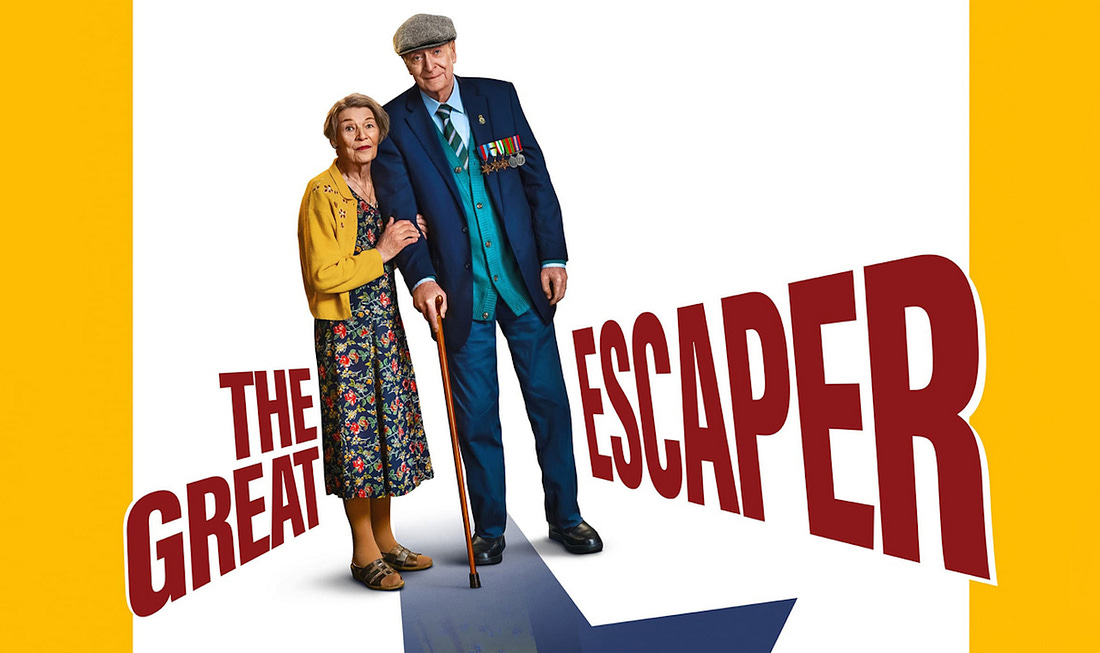The Great Escaper, Directed by Oliver Parker
The Great Escaper tells the story of 89-year-old WWII veteran Bernard Jordan's escape from his nursing home to go to France for the D-Day commemorations.

Starring Michael Caine, Glenda Jackson, and John Standing
Distributed by Warner Bros Pictures
Running time: 96 minutes
Rated 12A for infrequent strong language, moderate sex references
On June 5, 2014, eighty-nine-year-old World War II veteran Bernard Jordan slipped out of his nursing home and made his way across the English Channel to France to join the seventieth anniversary D-Day commemorations. Jordan had fought on the beaches of Normandy, and he later explained why he made the journey back: “My thoughts were with my mates who had been killed. I was going to pay my respects.”1 His trip caught the media’s attention, and newspapers gave him the nickname “The Great Escaper.”
This true story of dedication is the basis for the recent movie of the same name, starring Michael Caine as Bernard (aka Bernie). As Bernie makes his way to France, his wife, Rene (Glenda Jackson), deals with her failing health back at the nursing home. Meanwhile, flashback scenes show Bernie and Rene falling in love, along with Bernie’s harrowing experiences on the beaches of Normandy, packing a lot of story into its relatively short run time. This weaving of story lines is one way in which the film balances cheerful benevolence, and even humor, with the seriousness of its weightier subjects, including unearned guilt.
On his way to France, Bernie meets fellow veteran Arthur (John Standing), and the two bond over their war experiences, including heavy burdens of guilt both men still carry. Bernie had reassured a young soldier, Douglas, encouraging him to carry on with his orders—which meant driving a tank into the heat of battle. When his tank was blown up, Bernie was horrified, feeling that he himself had signed the man’s death warrant—a burden he has carried ever after. Arthur’s experience is arguably worse. He bombed a German city, not realizing that his brother had crash-landed nearby and had joined a band of resistance fighters there. His brother then died, and though it’s unclear whether Arthur’s bombs were the direct cause, Arthur believes they were.
Though these deaths were ultimately the fault of the Nazis, Bernie and Arthur wrestle with whether this was really the case.
Both feel a deep sense of guilt, a key part of their motivation to return for the anniversary. Their fateful meeting, however, helps both men heal. They give each other the courage to go see the graves of their fallen comrades—a crucial first step in letting go of the heavy guilt they’ve carried for so long.
At the cemetery in France, Bernie looks around at the thousands of graves, reflecting on the horrendous loss of life, and cries out, “What a waste!” It’s indicative of Bernie’s love of life, a quality he shares with Rene. Their love brings joy to the film. They take pleasure in the simple things; Rene, alone in the nursing home, puts on an old record and dances, remembering the times they danced together at parties when they were young. When Bernie returns from France, she tells him, “We have never wasted a single second of our time together. We have only done normal, little, everyday things. But by God, we did them well!”
Rene, although she is near the end of her life, is determined to enjoy it as much as she can. While her husband is away, she bonds with a young nurse, who looks up to her as a mother figure. Rene puts on makeup every day, chats pleasantly with everyone around her, and is a fount of good-natured wit. For example, when a nurse expresses her shock that Bernie has gone to France by himself, Rene deadpans, “Well, he has done it before. Only then, of course, they were shooting at him.”
Caine’s incredible performance brings his signature depth to the role and the film at large. The actor, now ninety, announced this will be his last movie, and it is a triumphant send-off. “I’ve played the lead, and it’s got incredible reviews,” he said. “We had a great time on the movie, and I thought, you know, why not leave now?”2
The film is a touching tribute to important aspects of a life well-lived: honoring your friends, cherishing your spouse, doing the things you want to do even when no one thinks you can, and celebrating the pleasure of being alive. If you want to savor life—with all its sorrow and joy—The Great Escaper is an excellent choice.




